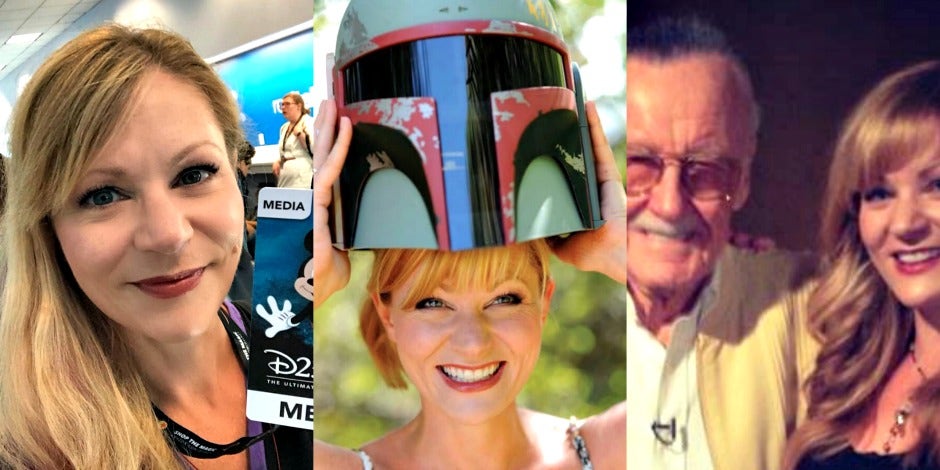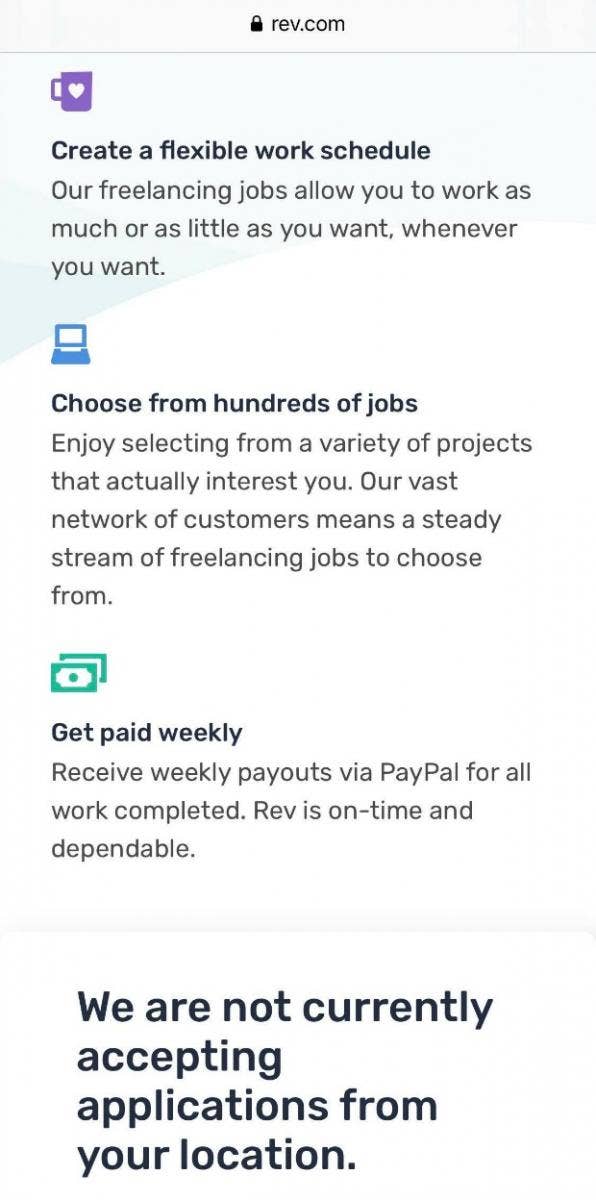I Built A Stellar Career As One Of The Only Women In Geek News, But California's New Law Could Destroy It All
California's AB5 aims to end exploitation of gig workers, but it's already killing careers instead.
 Courtesy of the author
Courtesy of the author I’m a freelance writer and my hard-earned career is about to be destroyed. Yours might be in jeopardy as well.
There’s a new law becoming effective in California on January 1, 2020, and it's being watched closely by legislators working on similar measures in states such as New Jersey and New York.
California Assembly Bill 5 (AB5), authored by Assemblywoman Lorena Gonzalez, caps a specific category of freelancers — writers, editors, newspaper cartoonists and photojournalists — at 35 submissions per year per publication or company.
Yes, you read that correctly. If clients want us to produce more than that, they must hire us as part or full-time employees and issue us W-2 tax forms, whether we want them to or not.
The law, which codifies a 2018 California Supreme Court decision known as Dynamex, was created with the intention of stopping misclassification of gig workers, like those who drive for Uber and Lyft. Instead, it fails to distinguish between independent contractors with established careers and people who are being exploited.
Gonzalez has stated that she believes companies will be forced to hire us all under AB5. They won’t.
Though AB5 offers full exemptions to independent contractors who offer certain professional services, like marketers, grant writers, graphic designers and fine artists, the rest of us who didn't meet Gonzalez's arbitrary standards for what counts as "good jobs" are already losing our contracts altogether.
Unlike companies with local clients needing local services, like people who use Uber and Lyft, those that hire writers don’t need to engage people who live within any particular state.
Unlike writers who work on staff for newspapers or print media, freelancers who write and create primarily digital content don’t have to work on site.
That means most publishers can easily avoid the hassle of complying with a 35-submission per writer limit by simply finding writers from other states (or even from overseas).
A wave of massive cuts across the already ailing media industry attests to the gravity of this situation.
In mid-December, Vox media announced they would be ending contracts with hundreds of freelancers regularly contributing to SB Nation, Curbed and Eater. And earlier in the fall, transcription site Rev ended contracts with all of their California freelancers, noting they will not be taking on more.

Freelancers are considering leaving the state in order to protect themselves, and companies are as well.
Though two lawsuits have been filed in response to the signing of AB5, including one brought by The American Society of Journalists and Authors, Inc. (ASJA) and the National Press Photographers Association (NPPA) with the assistance of the Pacific Legal Foundation, freelancers have no way of knowing when, or even if, things will change.
Companies are afraid to go over the 35 submission limit, and some of them are simply cutting ties with freelancers outright, if not massively cutting their assignments.
One way to maintain work as an independent contractor might be through a business-to-business (B2B) exemption, but for a lot of us who love what we do the way we do it and know that the perks outweigh the salary, the expense involved in the legal process of incorporation is out of our reach financially.
Think this is just an issue on the West Coast? It's not.
A similar law has already been enacted in Massachusetts and will soon be up for passage in New Jersey and New York, with some presidential candidates supporting a nationwide law that does the same thing.
Even if you do freelance work as a side hustle, you’re in danger. You may be about to lose that income, or find it cut significantly.
As for Gonzalez herself, well, her Twitter feed goes from asking questions to cursing at people for being upset over what she’s done.
In one post, she replied to someone's concerns about the law by stating — falsely — that no freelancers have ever claimed to be satisfied with things as they are.
“These were never good jobs," she said. "No one has ever suggested that, even freelancers. We will continue to work on this next year.”
One person responded to another of her posts about AB5 saying, “Don’t worry, people won’t be able to do 2-3 side hustles anymore. Thanks to you and #AB5."
She tweeted back, “They shouldn’t f—ing have to. And until you or anyone else that wants to bitch about AB5 puts out cognizant policy proposals to curb this chaos, you can keep your criticism anonymous. Good God."
This is what she’s saying to people who are losing their livelihoods. Seriously, in what way is this professional behavior from a government official and public servant?
Digital journalists from both ASJA and the recently formed California Freelance Writers United have meet with Gonzalez, and it’s been a struggle for them to explain to her what our work actually entails.
I personally spent four hours the other day, along with a number of writers, responding to a question she asked us on Twitter about how long it takes to write an article.
Well, we said, it depends if it’s a 250 word news story or a 10,000 word feature.
Clearly, Gonzalez doesn’t understand our business and didn’t do enough research before including us and others — like musicians, court reporters, translators and independent truckers — this bill.
During meetings with her, writers were told that the soonest anything in the law can be changed — if we can convince her to do so — is September 2020. That means ruin for many of us.
“These were never good jobs.”
I’m sorry Lorena, but you are very wrong.
Let me tell you how I got into this industry, so you'll know what freelancing means to some of us.
When I started in entertainment journalism, I was the only woman covering geek news.
On every set visit it was myself and 17 men. I was called a “fake geek girl” more times than I can count. I was told that I got my job because of my boobs, asked how many people I'd slept with so they’d write stories for me, and quizzed on everything from the different versions of Batman to my knowledge of obscure comics.
One “I don’t know that one” from me and I was clearly a liar whose boyfriend wrote all of her stories.
I’d say you wouldn’t believe the Twitter comments I got, but you probably would.
Despite that, I loved my job.
As my work gained exposure through my freelancing for dozens of sites, things started to change.
People recognized me because they saw my name everywhere. I wasn’t just an anomaly on one site. My name popped up anywhere geeks were getting their news.
Other women who love what I love saw that too, and I tried to help get the word out about them as well. I started a website to create a community of geek women because I had the recognition that made it possible for me do so.
When "Star Wars: The Force Awakens" premiered, I helped start a huge movement called #WheresRey that put companies on notice for the noticeable absence of Rey and other female action figures among Star Wars toys.
I was able to co-host a show with Marvel Comics' Stan Lee, something that would never have happened if I’d been less visible.
Slowly, I started to hear and see fewer comments like, “I didn’t know girls were into that,” and more along the lines of, “I love that you love Batman, too.”
Because of the variety and frequency of freelance assignments, I learned to write news stories, opinion pieces, reviews, features and do interviews in all different styles. I covered a wide range of topics. I showed the world that geek culture had a female face.
This allowed me to contribute to almost a dozen books, write two of my own, appear on television and in several comic book, TV and movie documentaries because of my work.
Writing for one site wouldn’t have done that for me.
In fact, the one time I did go that route, I wasn’t allowed to do anything else, and they owned my work. Under Section 101 of the United States Copyright Act, independent contractors own the copyright to their work by default, whereas work created by an employee is considered "work made for hire," and therefore owned by the employer.
Freelancing has changed the course of my life, and now it’s being taken away by a woman who doesn’t live in my city and doesn’t work in my industry — and by a law I wasn’t able to vote on.
To this day, I still freelance, though I’m losing jobs left and right because of Gonzalez’s AB5.
So are the multiple writers, podcasters, musicians, truckers, transcriptionists, translators, etc. who’s reasons for freelancing include being a stay-at-home parent, a caregiver, having disabilities that preclude a writer from working in an office, and so many more.
Recently published results of a study commissioned by Upwork and the Freelancers Union shows that "46% of freelancers agree freelancing gives them the flexibility they need because they’re unable to work for a traditional employer due to personal circumstances."
Gonzalez has stated that AB5’s cap of 35 submissions per year per publication was arbitrary.
Asking us how long it takes to write a story shows her absolute lack of understanding of our jobs. I’ve done 35 stories in a single day! It was a long day, but it happened.
No one can write a weekly column anymore without being on payroll.
Some of us want the freedom to write and broadcast this way.
I wanted to share my story because it’s really easy to dismiss freelance jobs, as Gonzalez has done, as something we have to do and must hate, or as something abusive being forced on us or that we've been brainwashed into accepted.
It’s easy for someone who doesn't understand the nature of our work to say we’re all doing these jobs until we manage to get "real" ones.
I want people to know that freelancers do this for reasons other than because we can’t get full-time jobs, and that many of us love the companies, publications and clients we contract with.
I want Assemblywoman Lorena Gonzalez to see what a real freelancer looks like, what we can do in the world, and how her law is hurting us.
It’s time for her, and for the rest of the country, to listen.
Jenna Busch is the founder and Editor-in-Chief of Legion of Leia (now part of Vital Thrills) and has hosted and written for sites like SYFY Fangrrls, Nerdist, ComingSoon.net, Metro, Birth. Movies. Death., IGN, AOL, The Washington Post, Huffington Post and more. She co-hosted Cocktails With Stan with the legendary Stan Lee and has appeared on ABC’s Nightline, Attack of the Show, Fresh Ink, Tabletop with Wil Wheaton, What the Flick?!, as well as in multiple documentaries, and is a member of the Broadcast Film Critics Association and the Broadcast Television Journalists Association, as well as the Greater Los Angeles Writers Society.

